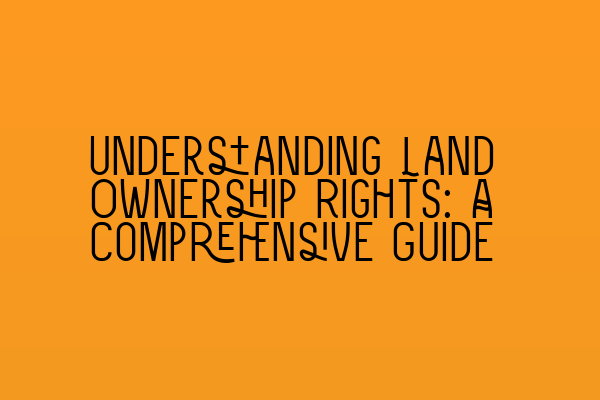Understanding Land Ownership Rights: A Comprehensive Guide
Welcome to SQE Property Law & Land Law’s comprehensive guide to understanding land ownership rights. Whether you are a property owner, potential buyer, or simply interested in the intricacies of land law, this guide will provide you with the essential knowledge you need to navigate the complex world of land ownership.
Before diving into the details, it’s important to mention that land ownership rights in the UK are governed by a variety of laws and regulations. These laws determine how land can be owned, transferred, and used, and they vary depending on the type of land and the specific circumstances involved. It’s crucial to consult with a qualified solicitor to ensure that you fully understand your rights and obligations.
Now, let’s explore some key concepts and terms related to land ownership:
Freehold vs. Leasehold:
When it comes to land ownership, there are two primary types: freehold and leasehold. Freehold ownership grants the owner full rights and title to the land indefinitely. On the other hand, leasehold ownership allows the occupier to use the land for a fixed period, typically under a lease agreement.
Easements and Covenants:
Easements are rights granted to individuals or entities to use another person’s land for a specific purpose, such as accessing a neighboring property. Covenants, on the other hand, are agreements between landowners that outline certain obligations or restrictions on land use. These can include restrictions on the type of buildings that can be constructed, or responsibilities for maintaining shared facilities.
Land Registration:
In the UK, land ownership is typically recorded in the Land Registry, which provides a public record of property rights and interests. Registering your land provides security and proof of ownership, as well as access to important details, such as boundaries and any existing restrictions or easements.
Title Deeds:
Title deeds are legal documents that provide evidence of land ownership. They contain important information about the property, including the names of previous owners, any restrictions on use, and details of any mortgages or charges on the property.
Boundary Disputes:
Boundary disputes can arise when there is uncertainty or disagreement over the location of property boundaries. Resolving such disputes can be complex, involving a careful examination of title deeds, land registration records, and physical evidence. It’s important to seek legal advice in such situations to protect your ownership rights.
Planning and Development:
When it comes to developing land, there are various considerations, including planning permission, building regulations, and environmental laws. Obtaining the necessary approvals and complying with regulations is crucial to avoid legal issues and potential fines. It’s advisable to engage with a solicitor experienced in property and land development to guide you through the process.
Land Ownership and Family Law:
In cases of divorce or separation, the division of assets, including land, can be a contentious issue. It’s important to understand how land ownership rights are affected by family law, and to seek professional advice when going through such situations.
As you can see, understanding land ownership rights involves a multitude of factors and considerations. It’s crucial to stay updated on changes in property laws and regulations to ensure compliance and protect your interests. For an overview of recent updates in UK property laws, please see our article: Updates in UK Property Laws: Key Changes and Implications.
Additionally, if you’re interested in learning more about legal challenges that may arise in property transactions, our comprehensive guide can provide valuable insights: Legal challenges in property transactions: A comprehensive guide.
For tenants and landlords seeking guidance on lease laws, our article on navigating lease laws in the UK provides essential information on rights and responsibilities: Navigating Lease Laws in the UK: Essential Guidelines for Tenants and Landlords.
For those preparing for property law exams, our article on avoiding common pitfalls and mastering property law questions will be invaluable: Dominate Property Law Questions: Avoiding Common Pitfalls.
Lastly, if you are a student studying land law and are looking for tips on revising and preparing for exams, our article on land law revision tips provides useful guidance: Land Law Revision Tips: Ace Your Exam Preparation.
In conclusion, understanding land ownership rights is vital for property owners, buyers, and anyone with an interest in land law. By familiarizing yourself with the concepts, regulations, and potential challenges related to land ownership, you can ensure the protection of your rights and make informed decisions. Remember to seek professional legal advice from experts like SQE Property Law & Land Law to navigate the complexities of land ownership successfully.
